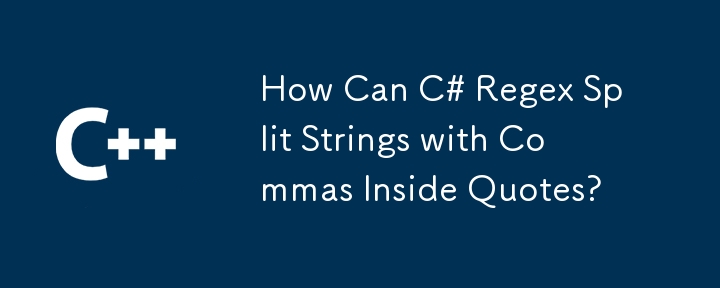Home >Backend Development >C++ >How Can C# Regex Split Strings with Commas Inside Quotes?
How Can C# Regex Split Strings with Commas Inside Quotes?
- Mary-Kate OlsenOriginal
- 2025-01-07 21:10:45267browse

C# regular expression string splitting: commas outside quotation marks
Handling strings containing embedded commas can be challenging using traditional comma-based splitting methods. This article demonstrates a solution using C# and regular expressions to split a string containing commas that may be surrounded by quotes.
Problem Statement:
Consider the following string representing a SQL code snippet:
<code>('ABCDEFG', 123542, 'XYZ 99,9')</code>
The goal is to split this string into three different parts:
- 'ABCDEFG'
- 123542
- 'XYZ 99,9'
The challenge arises because the comma in the third parameter ("XYZ 99,9") should not be considered a separator.
Regular expression solution:
To solve this problem, we can use a regular expression that only matches a comma if it is preceded by an even number of single quotes. This mode ensures that commas within quotes are not split.
<code>",(?=(?:[^']*'[^']*')*[^']*$)"</code>
Usage:
<code class="language-csharp">var result = Regex.Split(sampleString, ",(?=(?:[^']*'[^']*')*[^']*$)");</code>
Explanation:
- "," matches any comma in the string.
- (?=( starts a lookahead assertion.
- (?:[^']'[^']')* matches any number of sequences of non-single quote characters, followed by a single quote character.
- [^']* matches any number of non-single quote characters.
- $ matches the end of the string.
Output:
The output of the result array is as follows:
<code>{"'ABCDEFG'", "123542", "'XYZ 99,9'"}</code>
This demonstrates successfully splitting a string based on commas outside quotes while keeping the quoted arguments intact.
The above is the detailed content of How Can C# Regex Split Strings with Commas Inside Quotes?. For more information, please follow other related articles on the PHP Chinese website!
Related articles
See more- C++ compilation error: A header file is referenced multiple times, how to solve it?
- C++ compilation error: wrong function parameters, how to fix it?
- C++ error: The constructor must be declared in the public area, how to deal with it?
- Process management and thread synchronization in C++
- How to deal with data splitting problems in C++ development

